#historical context
Explore tagged Tumblr posts
Text
(Another response from me to this ongoing bastardy analysises that is bound to happen as this was an issue that the show created and does not seem to be dealing with it well enough as it has no consequence or no commitment to it to explore it well enough except for when they need character to be victims to gain brownie points. )
Starting from the argument that Joffrey was not necessary and too much risk, Rhaenyra should have stopped at 2 children with Harwin aa OP wrote as a response to a comment: You must have an heir and a spare for the Iron throne and the lordship of Driftmark with Joffrey he has a shared dpare for bot of these titles. She doesn't know she will marry Daemon she has to all she can. Also you must know that they live in the medieval era and children die very young even with the noble children. So they aren't like us modern people who can say okay I have done 2 kids it is enough. And this is proved by how her two olderst heirs die in the war they could have still died to diseases before that and she named Joffrey as his heir. The heir some people call unnecessary and needlesly risky was useful, the other kids were too young to be serious heirs. Also arguing a medieval women no matter how magical and royal and well educated would have an idea of planning her pregnancies and children is ludicrous, they are not modern women even if they are thought many things women are seen as broodmares and they don't think a second time about how dangerous and unplanned a pregancy is. Most of the Targ women that say they can't take another pregnancy are still impregnated and they still die. It is not even the general medieval information to understand Westeros, it is in the books that no such thought is given. In fact these girls do not know their sexuality and don't even understand what they are supposed to do in marriage in some occurences.
While I understand people thinking Rhaenyra acted very dangerously, it is still putting the wrong emphasis on the wrong subject. There was not such an emphasis on this in fire and blood because a clever royal who knows their power can always silence these rumors which is what Rhaenyra does in the books. However the main issue with the fandom's take on the subject comes from the source I think which for many is The House of the Dragon. Because the show gives so much modern understanding of things and modern actions to characters people start to forget these are not modern people and even the most educated of them don't have certain awareness and have reasons to believe they should act in any other way. For all we know Rhaenyra probably thought she needed to have children and she needed to have sex to have children but she did not have been thought to plan these pregnancies because back then women were simple being impregnated according to man's whim. And we must remember Rhaenyra is very young and still a teenager when she has Jace, Luke and Joffrey. She still doesn't understand the game she is playing to a full extent both in the bedroom and the courtroom. So not blaming Laenor who have not tried enough even though having non trueborn sons creates a risk for him and not blaming Harwin Strong who qould kniw better about these things and blaming Rhaenyra does not fit in the in-universe understanding of things as some like to call too. It is okay to blame all of them but no one in the fandom seems to ever mention the two mem in this equation while we have constant endless and same discussions about how Rhaenyra is at fault. And it is about one thing that could be her understandable fault as an heir and not about all of the other mistakes she has done on the show years later after becoming an heir and should be better at it. As she is still a young women who is having pregnancies back to back without much time to understand motherhood in between them is understansable for reasonable people in-universe which is why even tho they can not all men exploit their women.
Also I simply don't think they have more than very simple understanding of genetics so much so the rumours can be shut down by the ones at power. And it does not even become any part of Rhaenyra's downfall in the books, in universr characters and houses don't have as big of a problem as greens have. It is obvious that only two times this issue is put fort it is Vaemond, Aemond and The Greens, it is just another powerplay to winanother victory in game of thrones. It does not become a victory in any of these times which is why these scenes in the show looks more like used to get an emotional reaction from the audience that an actual problem that will result into something. Also these people do not know about Valyrians and their magical looks, they are just offput about how normal these boys look in the books which has more of George's actual design of events that correlate. As he sees removing a simple rule can break how the story unfolds he does not go long ways to dramatize the events that have no result. In the understanding of Westeros who genuinely don't have any knowledge to make more of these they are just rumors. It comes from lack of understanding in genetics and Valyrian magical people to put it simply. Giving more proof to bastardy by making Valeryons black and Rhaenys not black haired (also not having Harwong Strong and Aemma Arryn's physical descriptiona but that cannot be the case for a TV show so it gets a pass) takes away from the mystery of the heriatge of the boys, which then makes Rhaenyra too stupid to be believable for an heir who has befriended most of the houses in the realm and destroyed these rumors with an iron fist, which you must agree was more capable that the show version of events put her to be. No matter if you believe that the bastardy is true in the book or not book has nuance in a way that cannot be kept in a TV format 1:1 but still a better job could have easily be done in this regard for sure by at least keeping most of the known facts from the books and let the events play out more like how George envisioned them. I think the biggest mistakes of the show comes from not believing George's vision and believing too much that they can do better which resultd in them missing a lot of nuance which gives too little world building to general audience that a lot of the takes start becoming sensless repetition that just does not add anything to the show and only show how some of these decisions do not land as the way they want them to.
Rhaenyra reminds me of those white moms who have kids with a different race father and then refuses to acknowledge that they don’t have the same privileges as her. like she’s had so much privilege and power her whole life she can’t even see the corner she’s just backed her child, her heir into. She’s so dense that it hurts. Jace is right. ALICENT was right. Having three fucking kids with a man whose genes had proved to curb stomp yours IS an insult! Not bc bastards are evil or anything, but it’s a fucking insult to Jace, to Luke, to Joffery to drag them in a situation where they’re constantly demonized for YOUR actions and then REFUSE to own up to it even when your child is begging you with literal tears in their eyes to not take the one thing that saves him from the bullying and harassment YOU brought onto them. At this point, I’m extremely grateful the story ends with the targs in disarray bc none of those white haired fuckers deserve the throne (except for Baela and Jace, with brown hair
And to make it even worse, Jace is RIGHT. When the war is over and your brown haired, pug nosed child who looks exactly like someone NOT his legal father is named heir and you’ve taken his ONLY symbol of legitimacy away what will you do then?? Hmm?? I swear…
#anti hotd#anti house of the dragon#anti hotd writers#fire and blood#analysis#historical context#book context#book adaptation
2K notes
·
View notes
Text


Harry Truman interviewed in 1961.
503 notes
·
View notes
Text
Travels with Jonathan Harker, in pictures
If our good friend Jonathan Harker had sent us some photos along with his lovely email, here's what he might have included. All photos are as close to contemporary as I could find.
Left Munich at 8:35 P. M.:

arriving at Vienna early next morning:
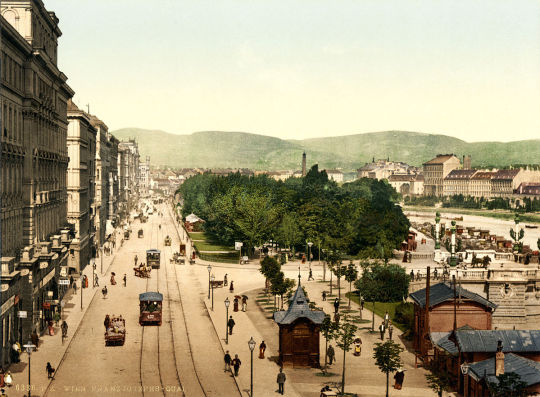
Buda-Pesth seems a wonderful place, from the glimpse which I got of it from the train and the little I could walk through the streets:
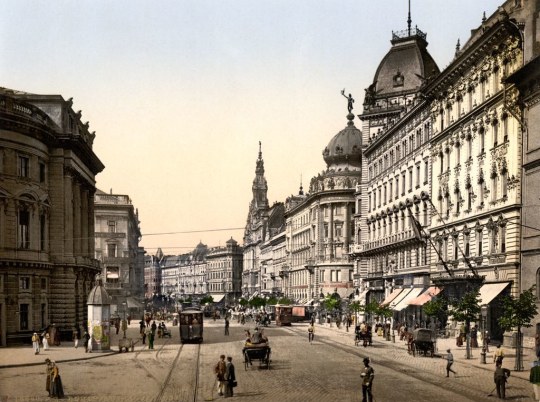
We left in pretty good time, and came after nightfall to Klausenburgh:

All day long we seemed to dawdle through a country which was full of beauty of every kind. Sometimes we saw little towns or castles on the top of steep hills such as we see in old missals:

sometimes we ran by rivers and streams which seemed from the wide stony margin on each side of them to be subject to great floods:
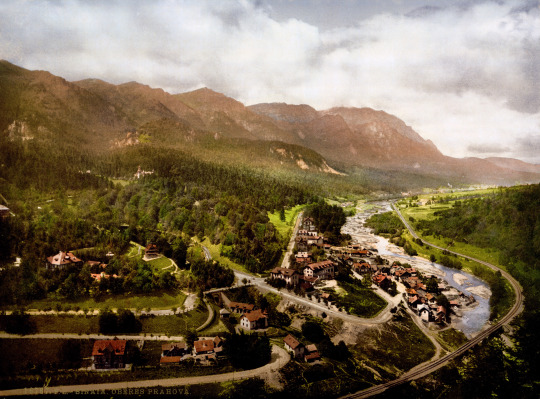
The women looked pretty, except when you got near them, but they were very clumsy about the waist. They had all full white sleeves of some kind or other, and most of them had big belts with a lot of strips of something fluttering from them like the dresses in a ballet, but of course there were petticoats under them:
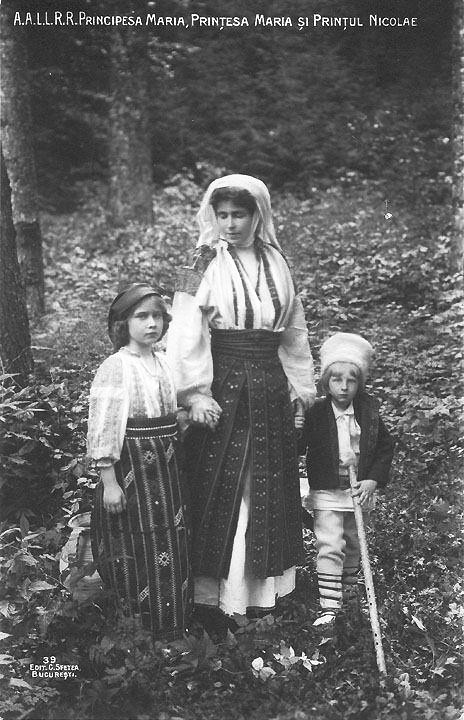

(on the left: the Romanian royal family in peasant cosplay in the early 1900s; on the right, a photoshoot of Romanian national dress in 1868)
It was on the dark side of twilight when we got to Bistritz, which is a very interesting old place:
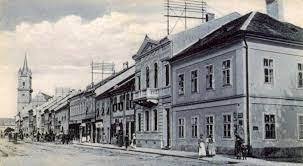
Bonus: a postcard Jonathan might have picked up for Mina.

7K notes
·
View notes
Text
The Origin of Vampire Rules

Something I always find very funny in vampire media is, that vampires usually have those certain rules, right? Vampires usually cannot go out into the sun. Often they will not be able to touch crosses or even be paralyzed by just looking at a cross. They might be shapeshifters. Vampires often cannot cross flowing water, and they also cannot cross a home without an invitation. Sometimes they are weirdly allergic against garlic. Also sometimes they have no mirror reflection. Or even not a shadow. They might not be able to cross onto sacred land (so for example they cannot set food on church ground). And of course they need to drink an undefined amount of blood.
And yes, this is just another excuse to talk about some more mythology - and how stuff happened to end up culture the way it did.
Origins of the Vampire Myths
Chances are, that someone told you that vampires are literally everywhere in the world and one of those myths that somehow is everywhere around.
This is not true - and mostly goes back to people applying "vampire" to pretty much everything that is arguably undead. Even though most of those figures technically are arguably a lot closer to zombies. If it does not leech energy or blood from living people, it is not a vampire.
So, actually vampires were a very specific thing that originated specifically in Eastern Europe. We are fairly certain that the origin of the myth came actually from some Ancient Greek myth that spread out into those places and then shifted. But the vampire itself comes from Slavic Myths. In those we have a variety of beings, that would qualify as vampires. Strigoi, Upir, Lugat, Moroi and quite a lot of others. There was a lot of overlap between those creatures and "evil witches" in a lot of times, and not all of them actually drank blood, but they drained at least your energy in some way.
Among people studying folklore folks are fairly certain that the myths came originally from people not fully understanding certain sicknesses. So basically, when a village was struck by a sickness like that, people would go: "Oh, this has to have been Alfred coming back from the dead," because Alfred recently died and it was the best explanation they came up with. And because people did not understand how dead bodies worked, they also would then see stuff like the hair and nails appearing longer when they opened the grave, which they saw as a proof that the dead was not really dead.
Generally speaking, there were then a couple of things that would be done to prevent them from coming back. Some people would just behead the dead body, others drove a stake through the heart of the people, while others might just tie up the legs of the dead.
But yeah, the one thing is that vampires come mainly from Slavic cultures. This is the important bit about vampires you need to remember. Because a lot of this comes back to this.
The Vampire Rules
The Vampire Rules are really fun, because they come together from three very different sources: From the fact that they were Slavic, from English folklore, and then from limitations in media.
So, let me go through typical vampire rules.
Vampires shapeshift: Vampires being shapeshifters goes back to Slavic mythology. In those vampires, witches and shapeshifters often were just the same kind of thing and had a lot of overlap.
Vampires cannot cross water: This originated probably in the Rennaissance. And it mainly originated from the fact that the people noticed that vampires only seemed to exist in Eastern Europe. Which people started to find weird. So, they had to come up with an explanation. And that explanation was: For some reason the vampires could not cross the Danube. This over time merged into "vampires cannot cross water".
Vampires are allergic against garlic: This is definitely something that goes back to the original myths. It is believed that this might be connected to the fact that garlic has an antibiotic effect. And as I said, vampire myths probably originated with unexplained sicknesses. So it is not hard to believe that people who ate garlic might not have gotten (as) sick, so folks were like: "Oh, the garlic kept the vampire away."
The stake through the heart kills vampires: This myth also comes from the vampire practices back then. On e way of burying a vampire in a way that it would not come back was to put a stake through the dead body.
The cross, not entering homes, and holy ground: Ironically, all those things that are probably connected to the same thing. Because these weaknesses are usually connected to more English folklore. While people definitely have hidden in churches (partly because of the law of sanctuary) forever, there is some good evidence that this actually comes more from British fairy culture - that then got applied to all other forms of paranormal creatures. And we know that around the 18th century, there was a whole big vampire scare in England, that definitely mixed a lot of Eastern European vampire lore with the lore of the Otherworld and Fae from Celtic mythology. Vampires having glamour of sorts probably is also connected to this.
Vampires do not have a reflection: This specifically is dated back to Bram Stoker, meaning everyone else after this just used this from Bram Stoker. The theory is that Stoker's idea was that mirrors somehow reflect the soul - something like that.
The Baptism of Blood: Another vampire thing that goes back to Stoker specifically is vampires having to exchange blood with someone to make them a vampire. Aka, drinking thier victims blood and then giving blood to them. In fact, in Stoker's work it was implied to have to happen three times until someone is turned a vampire. Which at least makes sure there are no accidental vampires.
Vampires drinking blood: Ironically the specific thing of vampires drinking blood also comes from Victorian Gothic literature. While this was not fully unheard off in mythology, it was not such a common trait there. But in Victorian literature it became THE vampire calling card. And this for two reasons. Reason 1: Welp, blood drinking is a neat symbolism for sex at time where you were not allowed to write about sex. Reason 2: ... Anti-Semitism and blood libel. I am sorry I could talk around this, but yeah, we definitely are certain that some of the Victorian vampires drink blood because the folks writing were implying blood libel. Welp.
Why Vampires Burn in the Sunlight: The dumbest bit of vampire lore I know is why vampires burn in sunlight. No, this does not originate with mythology - neither Slavic, nor Celtic. No, this does not go back to Dracula or another book of the time. Vampires in Victorian literature were fine and dandy in the sun. They might not be able to use certain magics, but other than that they were fine. No, the reason vampires burn in sunlight is... that the original Nosfertu ran out of budget, and needed a convenient way to dispatch the vampire. So they decided: "Oh, actually he burns in sunlight." And then, that stuck.
#castlevania#castlevania netflix#castlevania nocturne#dracula#dracula daily#vampires#vampire mythology#interview with the vampire#carmilla#gothic fiction#horror fiction#vampire novels#history#historical context#slavic mythology
183 notes
·
View notes
Text
I hadn't the heart to write last night; that terrible record of Jonathan's upset me so. Poor dear! How he must have suffered, whether it be true or only imagination. I wonder if there is any truth in it at all.
Mina writes this as a response after reading Jonathan's journal all by herself, without any outside influence, and oh how beautifully merciful it is.
This book, this novel came out in 1897 right in the middle of queen Victoria's diamond jubilee in england. The first successful self driving taxis go through the streets, the public has noticed the national decline as urban poverty had rised more, and the Lunacy act has been introduced just seven years ago (1890) in which the only people who could ever have access to victorian england's psychiatric treatment were the certified as "mentally insane", which then were admitted to an asylum* shortly after.
(*different rules for different socioeconomical classes apply.)
Of course this being victorian england meant that stigma, and prejudice ran rampant after the poor people subjected to these treatments in order to place them outside of what was deemed polite society. Moreso when the actual label given to you once you were admitted was "pauper lunatic", or whatever your doctor decided for you if you were wealthy enough to escape the label. In all of this social climate, this stigma, this prejudice, here comes Mina, recently married woman to Jonathan who comes from a harrowing experience marked by a brain fever coming all the way from Transylvania.
It was not recommended to marry men like Jonathan because of his illness, and Mina did it anyway. The mere concept of ptsd (and everything that comes with it) is only applied to soldiers who are thrown into the psychiatric system by their families, yet Mina guided and cared for Jonathan after he had a panic attack without caring who might see. Jonathan wrote about the most horrifying events that a young person could see done by a supernatural monster, and Mina (despite being on the fence about the truth of the journal) expresses empathy for his suffering.
For Mina, it doesn't matter if what is written on the journal is real or the terrified ramblings of her traumatized husband, she knows that what matters is that Jonathan suffered greatly, and that she has to help him. Even if Mina debated to herself about the possibilities of everything, she decides that she can't just do nothing with all of this information, she can't simply ignore, so Mina wipes out the typewriter... Just in case.
#This is the best response to the horrors without dismissing them which makes Mina the best woman ever#dracula daily#dracula#mina harker#mina murray#jonathan harker#jonmina#historical context
359 notes
·
View notes
Text
Now some Vampire Lore, which explains why Lucy mainly attacks children and is Voluptuous. Other than children being a much easier, vulnerable target for a new vampire, especially at night, and vampires being attractive to lure people to them:
One of Stoker's primary sources was Ármin Vámbéry, a Hungarian-Jewish traveler and orientalist. Van Helsing even gives him a shout-out in the book later. Stoker consulted him a lot about the legends in the Balkans and Austria-Hungary (which Transylvania was part of at the time).
Dracula is heavily based on the area's Strigoi. And partly on the Estries (who are associated with the Succubi: Beautiful, blood-thirsty female demons, with succubi thought to favor babies and young children as prey.) The Strigoi are closer to what we know as vampires due to them rising from the grave, or being created by something unholy. So Lucy turned into a child-drinking succubus.
The Strigoi and Estries both:
Gain vitality by drinking human blood
Can shapeshift
Influence people's minds
Mainly feed on infants and children
the Strigoi also target young girls, the Estries target all genders but mostly men
On the child feeding, Wilhelm Schmidt reports in 1865 the tradition "upon the birth of a child, when one tosses a stone behind oneself and exclaims "This into the mouth of the strigoi!" Note the stones found in the skulls of people suspected to have been vampires.
There are striking similarities between them and the Estries. Note the common "strix" root. Screaming is also a feature that they have, which is similar to the banshee.
More about the Count and less about Lucy: The Strigoi are associated with sorcery, which is very relevant in Dracula, as he used to be a sorcerer of Scholomance. The Strigoi influence people's minds, especially those who are ill, have sleeping issues, suffer from alcoholism, and more. This is shown by Dracula's influence on the sleepwalking Lucy and on Renfield.
#dracula daily#re: dracula#historical context#count dracula#lucy westenra#jack seward#mythological#dracula#jonathan harker#cw child death mention
741 notes
·
View notes
Text









COLORS, SYMBOLISM AND HISTORICAL PARALLELS BLUE • In the 12th century the Roman Catholic Church dictated that painters in Italy (and the rest of Europe consequently) to paint the Virgin Mary with blue, which became associated with holiness, humility and virtue. • Paintings of the mythical King Arthur began to show him dressed in blue. The coat of arms of the kings of France became an azure or light blue shield, sprinkled with golden fleur-de-lis or lilies. Blue had come from obscurity to become the royal colour. • Cobalt was originally discovered in the 8th and 9th centuries, where it was used to decorate ceramics and jewelry. • Cerulean comes from the Latin word caeruleus, which means “dark blue” and is most likely derived from caelum, the Latin word for “sky.”
#hotd#house of the dragon#house targaryen#the dance of the dragons#pre asoiaf#asoif/got#rhaenyra targaryen#daemon x rhaenyra#medieval history#history#historical context#queen alicent#alicent hightower#team black#fantasy costume#medieval costume#fantasy#daemon targaryen#daemyra#helaena targaryen#laena velaryon
63 notes
·
View notes
Text
About Hogwarts Castle's Architecture
I think the history is wrong... Like, stone castles only became a thing in Britain when the Normans brought the practice over with them from France (Norman rule was officially established in 1066). And the first stone castles in Scotland were only built around the 1100s. Hogwarts was built around the 990s... so what's up with that?
(Like, there were some fortified stone structures in Scotland pre-normans (brochs), but no one would really call them a typical castle. Also, they were built in the Iron Age (Brochs were specifically built between 400 BC and 200 AD), so not the founders' times)
Also, many of the architectural details of Hogwarts in the movies/Hogwarts Legacy/any other video games/illustrations have much later influences, what with the Gothic architecture (which only came around in the 1200s) and elements from Victorian restored castles (I'll go more about what this means later).
And I have a Watsonian theory/headcanon to make it make sense.
What I think, is that the Hogwarts castle we (and the characters) experience, has been heavily reconstructed over the past thousand years. So Hogwarts likely started as a simpler, wooden structure (as was common in Scotland around the 10th century) and it changed and grew and evolved throughout the centuries.
So we'll walk through the history of castle architecture in Scotland and explain how Hogwats evolved over the years. (Becouse I'm an architecture and history nerd, sue me).
Pre Founders
Hogwarts is legend to have been built where the founders found a pensive:
The Hogwarts Pensieve is made of ornately carved stone and is engraved with modified Saxon runes, which mark it as an artefact of immense antiquity that pre-dates the creation of the school. One (unsubstantiated) legend says that the founders discovered the Pensieve half-buried in the ground on the very spot where they decided to erect their school.
(Pottermore)
So, the location probably wasn't empty, but had some evidence of past wizarding residence there. How much is unclear, but it was a place magic was practiced in before the founders.
990s
Hogwarts is founded as a school and sanctuary. Muggles at the time didn't really believe in witchcraft (the church considers believing in witchcraft heresy). So, it's not really to protect themselves together, but more to allow wizards to build a united community.
There is an element of hiding magic from muggles:
Why didn’t we choose to produce flying barrels, flying armchairs, flying bathtubs – why brooms? Shrewd enough to see that their Muggle neighbours would seek to exploit their powers if they knew their full extent, witches and wizards kept themselves to themselves long before the International Statute of Wizarding Secrecy came into effect.
(Quidditch Through the Ages)
But it's not for the same reason as the later witch hunts. At this time, people who confessed to witchcraft would need to repent (not via execution, mind) because they'd be seen as delusional. After all, magic doesn't exist according to church doctrine at the time. and as mentioned in the book, the concern was to be bothered to help muggles with everything, not because they were hunted at the time.
Around this time there is the magical government in England at least, is the Wizard Council, also known as the Wizengamot. Due to the similar name, the muggle Wittengamot (the council of lords that chose the king of England) might be aware of their wizard equivalent, but they might also be completely unaware (explained in the next section).
Castles, in this time period in the UK, looked something like this:


Hogwarts, when founded, probably looked like this combination of buildings and not what we imagine as a castle.
with the Chamber of Secrets as a basement. It's canon that a Gaunt later added the pipe entrance from the bathroom, so it's original entrance lay elsewhere.
Note that this means it wasn't the founders who but the Common Rooms, Room of Requirement, or the moving staircases and that the in-universe history books are wrong.
Since Hogsmeade was founded by Hengist of Woodcroft who was a student of Helga Hufflepuff when she was alive, the village was probably founded in the century following the school's founding.
1000s-1100s
Here we get the Norman Conquest of England, and while Scotland wasn't Norman, the culture in Scotland was influenced by the changes down south. Specifically, castle architecture is something they copied from the Normans.
The reason I mentioned earlier the muggle Witengamot might've not been aware of the wizarding community is because we know William brought with him wizards in his army, like the Malfoys:
Like many other progenitors of noble English families, the wizard Armand Malfoy arrived in Britain with William the Conqueror as part of the invading Norman army. Having rendered unknown, shady (and almost certainly magical) services to King William I, Malfoy was given a prime piece of land in Wiltshire, seized from local landowners, upon which his descendants have lived for ten consecutive centuries.
(Pottermore)
But many other pureblood wizard family names we can date back to the Norman invasion. Such as: Lestrange, Peverell, Wealey, Gaunt, etc. So, it's somewhat implied William won England with the help of wizards that the local Anglo-Saxon English didn't have fighting with them.
Due to these Norman wizards clearly getting positions of influence in the wizarding community (talked a bit more about this here[]), it's likely they or even William himself wanted to improve Hogwarts to keep the wizardibg population onside.
So, around the later 1000s or early 1100 Hogwarts would've looked something like this:



So, basically, the same structure as before, but the keep (where the Great Hall is, is built from stone. The Great Hall (AKA the most defensible place in the castle everyone fell back to in the Battle of Hogwarts) was the first built.
As for the inside:



We have geometric details on the columns and archways (which are round, it's not yet the pointed gothic arches we all know and love). The walls would all be painted white and then colorful and vibrant colors over it (somewhat visible in the picture on the left).
1200s-1300s
Throughout the next two centuries, more and more wings would be added to the castle. Many of the classrooms and dorms that were outside the keep in the outer buildings moved to these new wings inside the main stone castle. The outer walls & fortifications would also be improved and extended from the former ones and a proper gatehouse would likely be built:


And a few churches, since they tended to be more decorated on the outside and I want to explain this is when gothic architecture was a thing and that most of the styles we recognize for castles are from this period:



This is when the Room of Requirement, the moving staircases, the towers (the Astronomy Tower, the Headmaster's Tower, and perhaps the Owlery), and the various common rooms would be built.
(Note the castle on the left would've likely had a whitewash on all of the exterior back in the day)
At this point, the Great Hall, and the quad if we think of the typical Hogwarts castle would be built:

(Image from Hogwarts Legacy)
There would be no transfiguration courtyard area yet and no clocktower yet as they are likely later additions.
I'd also note the inside of the castle, would look something like this at this point:
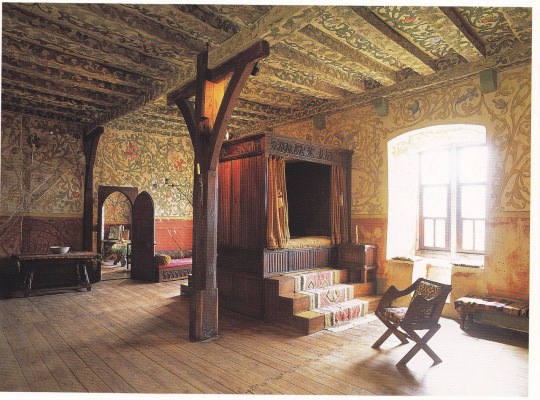


The walls would be painted and colorful and vibrant. You might also see wall hangings like we see in the Gryffindor Common room in the movies, that's actually accurate (the wall tapestry/curtain things, not the furniture, the furniture is 17th and 18th century) except the stone would likely not be bear stone and instead have a whitewash over it and tapestries over the whitewashed stone. Bear stone wasn't an all that common look in this era unless they used pretty stones that were meant to be shown off (which was expensive, hence rare).
1500s-1600s
This period is still building in a style called Gothic (12th to 16th century), but we're adding more intricate detail, and the style for furniture changes quite drastically (because we've entered the Tudor area). I believe that around the 1500s and the 1600s, more wings were added, like the clocktower, the transfiguration courtyard, and the viaduct (a bridge was probably there before, but I think it was rebuilt with the new building):

The style of buildings we're looking at now would have this sort of exterior:
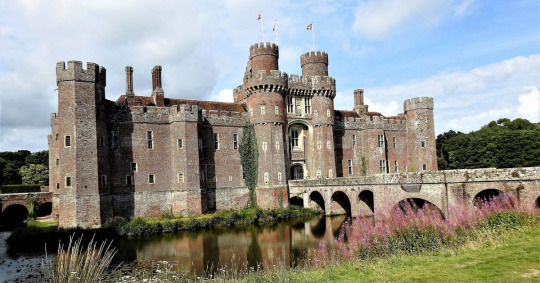


(Note the house on the left and castle on the white would've likely had a whitewash on all of the exterior back in the day)
And this is the interior we're talking about:
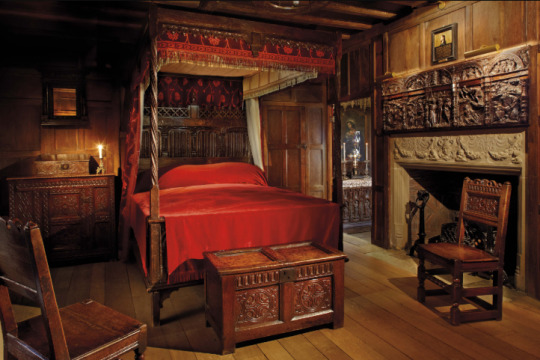

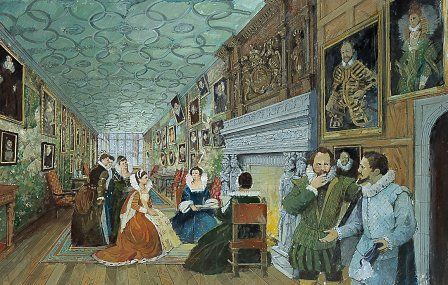
Also, up until this point, greenhouses weren't really a thing (at least not the glasshouse variety). I assume there was an Herbology Garden or that perhaps a Vegetable Patch Harry mentions exists next to the greenhouses and served as the place where they grew plants because glasshouses like we think of when we read the word "greenhouse" were only started being built in England late in the 16th century. So the Greenhouses are likely a 17th-century addition since the wizards probably adopted them a little later than the muggles.
1700s
This is when indoor plumbing was introduced to Hogwarts and the entrance to the Chamber of Secrets was changed:
When first created, the Chamber was accessed through a concealed trapdoor and a series of magical tunnels. However, when Hogwarts’ plumbing became more elaborate in the eighteenth century (this was a rare instance of wizards copying Muggles, because hitherto they simply relieved themselves wherever they stood, and vanished the evidence), the entrance to the Chamber was threatened, being located on the site of a proposed bathroom. The presence in school at the time of a student called Corvinus Gaunt – direct descendant of Slytherin, and antecedent of Tom Riddle – explains how the simple trapdoor was secretly protected, so that those who knew how could still access the entrance to the Chamber even after newfangled plumbing had been placed on top of it.
(Pottermore)
1800s
Now, back to what I mentioned in the opening paragraph about Victorian castle reconstruction. So, during the Victorian era, many rich people bought castles to restore and preserve them. Victorians in England were kinda obsessed with the Medieval period (and Ancient Egypt, but we're not talking about that right now) so they wanted to be able to walk around castles, and they had a lot of castles in the UK that fell into disrepair and just stood there empty. The thing is, the Victorian people who restored castles had no idea what Medieval castles actually looked like in the Medieval period. So all the castles you see with this sort of interior (which are most reconstructed castles, btw):
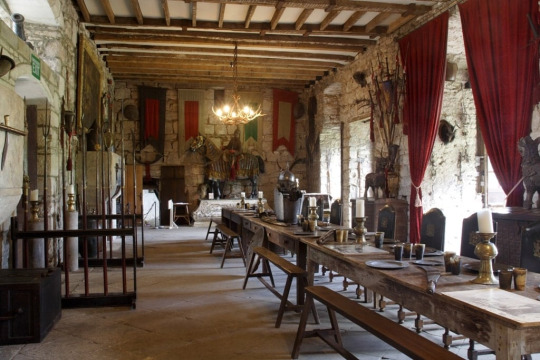
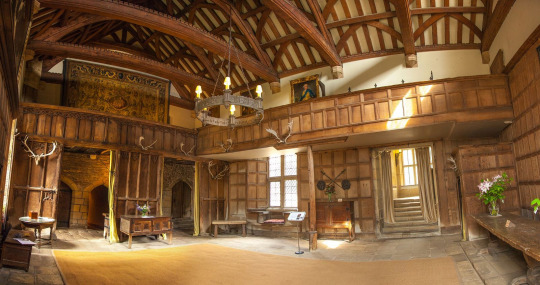
That's a Victorian reconstruction. They built how they imagined medieval castles looked like according to their own tastes and aesthetics and what they saw from more recent Todur castles, not how medieval castles actually looked like.
That being said, Hogwarts was continuously used throughout all these years, so I imagine some of these Victorian elements would make their way in, but not to the same level as these reconstructions.
Basically, different locations in the castle would look different depending on when they were built. Most furniture is likely to have been replaced more recently and would at most date back to the 1500s. So, we'll see a lot of dark wood furniture that isn't painted the way they would've painted furniture in the medieval period.
I'd also expect that some of the older walls/ceilings are still painted very vibrantly (which fits with the wizard's sense of style overall).
Basically, I think the Hogwarts we experienced in the books wasn't built in one year as a monolith by the founders. It was added to over time. Rooms that look older Medieval, and ones that look like a Tudor addition would all exist within the same castle. Areas in the older sections would have 18th-century wooden paneling because reconstruction was needed. I personally think that's the right way to go about designing Hogwarts since most castles in Britain are like that (and in the rest of Europe).
Castles changed and grew according to the needs of whoever lived there at the time and the technology available. And since, well, at some point castles weren't needed as fortified structures anymore, they lost fortifications for aesthetics. We have no surviving castles that actually look the way they did back when they were built. All the preserved ones had wings added, walls paneled with wood, and the windows replaced. And in many of them, you can actually see the patchwork in the bricks, the window style changing from one window to the next across a single wall. I think that's part of what makes castles gorgeous and it always made sense to me Hogwarts was like that too.
#harry potter#hp#hp meta#hollowedtheory#harry potter meta#wizarding world#hogwarts#hogwarts school of witchcraft and wizardry#hogwarts castle#wizarding world of harry potter#hollowedheadcanon#hp headcanon#hollowed hp redesign#historical context#wizarding history
67 notes
·
View notes
Text
Hugo had a classmate named Joly. The boy was from a rich and respectable family, but he started gambling, spent his family fortune, and ended up in prison for forgery. Thanks to Hugo’s intervention, his sentence was shortened to four years. In the mid-1840s, a white-haired man in ragged clothes approached Hugo, and he hardly recognized Joly. He gave him money once, twice… and as it continued for some time, Hugo decided he had enough.
As a result, he used Joly’s story for several purposes. His life story became a kind of antithesis to Valjean’s: a tale of moral degradation and loss of money was reversed into a story of moral reform and upward social mobility. Joly, like Valjean, broke his parole and instead of the ascribed place of residence, he arrived in Paris where he met Hugo. Finally, his name was given to one of Les Amis.
127 notes
·
View notes
Text
Jonathan Harker praises the bottle of Tokaji wine he was served at Dracula's Castle on his first night there.
Tokaji is one of the oldest dessert wines. Sweet, intense in flavor, and prestigious. Produced in Tokay, Hungary since the 16th century. Most often paired with spicy and hot dishes.
Apparently Jonathan enjoys sweet, intense wines.
Erik in The Phantom Of The Opera novel offers Tokaji to Christine Daaé during her first visit in his lair.
Mephistopheles in Goethe's Faust serves it to the young lovestruck Siébel. (Siébel: 'No wine for me can ever be too sweet.' Mephistopheles: 'My best Tokaji shall presently appear.')
In the 19th century it was used as a remedy for plague and anemia
(all this occurred to me thanks to @wheresjonno while thinking about what Jonathan would enjoy in a euro food tour)
#in the 19th century it was used as a remedy for plague and anemia#dracula daily#jonathan harker#dracula#re: dracula#the phantom of the opera#faust#poto#wine#historical context
558 notes
·
View notes
Text
Time period post: General slang
Im going to keep my time period posts going, and since I pulled my “tough slang” up out of the depths of my blog I thought I’d also do a quick guide for more general 1960s slang that’s not greaser/JD specific.
Quick note:
There was also a greater use of expressions or sayings than we use today. Same goes for sarcasm, yes it still gets used but there’s a slight difference. People have always cursed even if it wasn’t the social norm/polite issue— so there was a a lot of creativity in insults, being rude or telling someone off.
This is just sort of a “quick guide” there is a lot out there and I recommend looking into more if you’re interested. Some sites repeat a lot of stuff but it’s neat to go digging
Amped : maximum, excited
“Around the bend” : crazy or strange
“Ate it” : wounded/got hurt
Babe: attractive young woman or form of address
Back off : leave alone
Bad scene: unpleasant place or event
Bag: steal or deal/problem
Bail: leave
Ball: Sex [Certain context]
“Beats Me” : I don’t know
“Beat it” : leave quick/ get out
Blast: good time
Big deal:
Bitchin’ : good or great
Bod: body
Blotto: extremely drunk
Boss: cool / great
Book: leave fast
Bomb around: drive around (usually speeding)
Brew: alcohol/beer
Broad : Female
Bum around: go around with no particular purpose
Bum[Verb] : borrow (ex. Bum a cigarette)
Bummer : disappointment
Cancer stick: cigarettes
Cat: guy/ person (presumably cool)
Chick: female
Chicken: coward ; game of bluff usually played with cars (chicken run)
Chicken shit: Coward
Chill/chill out : calm down
Circuit : round trip (in relation to cruising)
Choice: really cool
“Cop a feel” : second base with a girl (touch boob)
Crash: go to sleep/pass out
Cream: totally beat in a fight
Creep: obnoxious or eccentric person
Cruising: drive up and down a street looking for a race, girls, guys etc.
Decked out: dressed up
Dead soldier: empty can or bottle (typically alcohol)
Dig: understand/agree
“Don’t give me any grief”: don’t complain/make trouble
Drop dead: similar to get bent/Get lost/Go f yourself
Establishment: part of status quo
Flake: quirky or weird
Flake out: Chicken out/leave someone somewhere alone
Fine: good looking
Fucking A: expression of either positive or negative meaning
Full of it : wrong or lying
Fuzz: cops
Get kicks : get enjoyment: pleasure
Golly: God
Gosh: God
Going steady: dating (serious)
Going together/around together: see above, can be serious or non serious
Groovy: something good
Grungy: shabby, dirty, bad person
Had/been had: tricked/dooped
Heat: police
High: used interchangeably for intoxication- alcohol or drugs
Hip: cool, with it
Hit: take a drag
Hop : dance or dancing party
Hot: sexually attractive person
Hot (for someone): really into someone
Hunk: good looking guy
“It’s been real”: it’s been nice (usually sarcastic)
“It’s a gas”:
Jeez: Exclamation, way to avoid saying “Jesus”
Knock out: really good looking girl
Kiss off: stop or leave
Later: short for see you later/by
Lay rubber: peel out, drive fast
Let’s go: let’s dance | let’s leave | let’s fight
Lit: high/loaded/intoxicated
Loaded: high or drunk
Lousy: bad (feeling), poor quality/lame
Lump it: live with it
Made it : Had sex/had sex with
Mess around: to be playful in a general or in a sexual way
Moon [Verb]: take pants down and expose butt to someone (usually as a joke)
Neat: excellent/ nice or cool
Neato:
Nifty: skilled, cool
Not bad: good
No sweat: no problem: don’t worry about it
“Name is mud” : people are mad at you because of something you have said or done (or hadn’t done)
Out of sight: fantastic , neat
Pick up: flirt / offer to date
Pound: beat
Preppie: someone who is well dressed in expensive conservative clothing and has a private education (becomes more common in 80s) -> socialite
Put out: agree to have sex (most common use)
Punk out: Back out / give up (negative)
Ride: car/vehicle
Rod/hot rod: car/ supped up car
Save face: Maintain public image
Scene- community or place : someone drawing attention to themselves in a negative light
Scram: go away/ leave quick
Sharp- stylish : agreeing with someone
“Spare me”: used to express annoyance/disbelief
Spastic: stupid person, or a person who behaves or moves in a strange or uncontrolled way
Social: Short for socialite (Soc is short for it) - prep is similar but not exact
Struck out: be un successful/fail to pick someone up
Superfine: high quality / real deal
Submarine race: someplace secluded to make out, fool around or have sex (usually by water)
Swinging: similar to groovy or bitchin’ (good/cool)
Too much:
Trippy: weird or strange (inspired by effects of drugs like LSD)
Tuck and roll: type of car upholstery
Tube/boob-tube: television
“Up for grabs”: available
Wack/ wacky: not good
“What a waste”/ waste of: something not favorable
“Where do you get off?”: what gives you the right? How dare you
Way out: eccentric or unconventional
Wimp: weak or cowardly
Wiggy: crazy/ weird
Wig out: freak out
Wig city: crazy/ weird
With it: cool, digs it/understood
Wiz : pee (leak as well)
Zit : pimple
#the outsiders#outsiders 1983#outsiders#outsiders book#outsiders novel#time period post#time period post: general slang#1960s#historical context#vernacular#writing help#slang dictionary
105 notes
·
View notes
Text


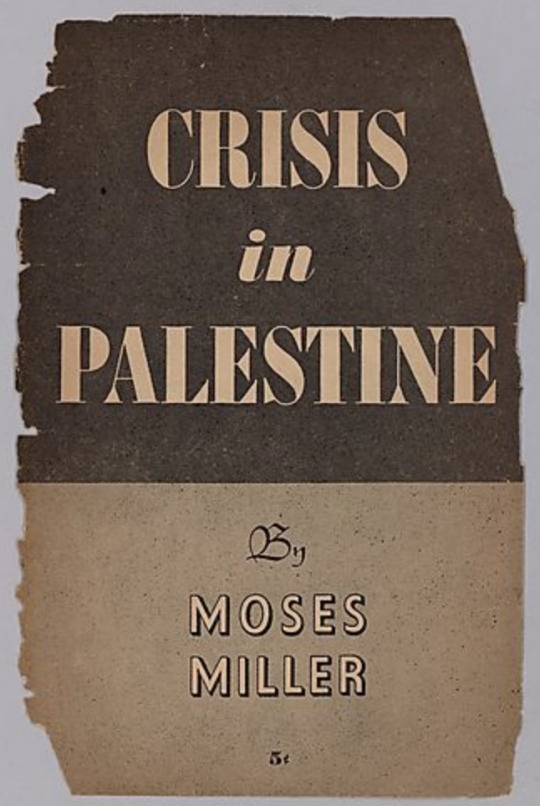





Just a bunch of irrelevant pamphlets from 1946...
298 notes
·
View notes
Text
I know we've all moved on from Mina's Brief Foray into Misogyny in favour of Jonathan Is Back, Hooray! but
I do think it's interesting to read real contemporary women's views on the early women's rights movement, and honestly Bram Stoker's depiction of how Mina sees things isn't all that far off (i.e. he's not just writing her that way because he's a clueless man).
A while ago, I read the memoirs of Maud Allan, an Edwardian dancer who lived a truly fascinating and often tragic life; it's worth reading her whole Wikipedia page. Her memoirs, published 1908, are not particularly worth reading (they were primarily publicity material), but there is one section where she talks about her views on women's suffrage.
Maud Allan was a highly educated, often controversial figure, who danced topless but for some intricate jewellery. She made her own living, and was most likely a lesbian - so all in all, much like Mina, not someone you would think of as likely to be ambivalent on gender equality. Nonetheless, she argued:
Women should "influence rather than dictate"
Women should be educated; she did not believe there was any difference between male and female intelligence, only in the opportunities they received
The rightful destiny of every woman was to be a wife and mother [even though she was neither]
Women were swayed by emotion more than men, so shouldn't become lawyers
Women would be swayed by the looks and personality of a political candidate, not by his views
As a result, in most areas men and women should be equal - but not in terms of the franchise, or at least not yet.
(The whole chapter is here).
I find this fascinating because from a modern-day perspective, it's so obviously inconsistent and muddled, in particular the sense of gender equality as a kind of grab-bag where women should be equal in some areas but not others. But these were the honest views of an educated, independent woman, and I could imagine a real-world Mina having a similar set of views.
890 notes
·
View notes
Text
The Revolution of Saint Domingue after 1793

Alright @xshingie asked me about what happened on Saint Domingue after the events of 1793, because of the violence that eventually happened there. Which is quite convenient, as my French History tome just reached the "Revolution in the Colonies".
Castlevania Nocturne does a bit into the original slave uprising, which we mainly see from Annette's POV. This is your friendly reminder: If you saw the violence inflicted on some of the white plantation owners and thought "How horrible!" then you are a shitty person. Because the violence inflicted on those slaves before had been a lot worse. Slavery is the worst kind of violence. Always.
However, Nocturne obviously does not go that far into the details of it. Specifically it does not fully go into the difference between Free Men of Color, and the Black Slaves, and how only recently those Free Men were also considered citizen. It does not go into how a lot of Free Men also owned slaves. And most notably it also does not go into the mistake of the French Revolution to send a commander to Saint Domingue, who was an abolitionist, to stop the revolution in the colony. He obviously arrived there and was like: "Hey, rebels. Would you stop rebelling, if we gave you freedom and full rights of citizens?" And they were like: "Duh, that is what we are rebelling for." And he wrote back to France: "Welp, my hands are tied. It turns out I need to given them freedom."
And indeed, this succeeded. France declared the end of slavery, and while a lot of whites fled from the colonies to what was the freshly founded USA, where slavery was still legal. However, not all whites fled.
Of course, there was another problem, though: While some of the now freed people just started their own little farms where they cultivated food for themselves, which worked fine in feeding the people for now, some people understood how much worth the colonial products were to France and how much they were needed to support the revolution.
So, while the people were freed, many of them were ultimately forced again to work on the sugar and tabacco plantations - even though now they were being paid. They still were not given a choice about their work, which created a rather bad atmosphere. Because those people did not want to work those same sugar fields, obviously.
And of course the white French, who remained on the Island were not happy with those changed results. And there were several counter revolutionary attempts, but for a couple of days they went nowhere. Yes, people died because of it, but it still did not change anything.
And among the people on Saint Domingue - especially the Blacks - there rose the idea of being an independent republic.
Then came Napoleon.

I really cannot overemphasize how much Napoleon is responsible for everything in Europe and the former colonies today - especially the former French colonies.
In 1792 Toussaint Louverture, a self-freed slave took over the leadership role in Saint Domingue, and he had those ideas of making the country independent. And then Napoleon came into power in France, and Napoleon very much hated that idea.
Mind you, Napoleon was originally a revolutionary soldier. But basically Napoleon was: "You know what the problem was with absolute power? The wrong person in power. Thankfully I am the right person!"
I will not go too much into details when it comes to military movements and tactics. Let's just say: Napoleon send people over to Saint Domingue to regain the island. Spain and England also tried to get the island. And the free Blacks decided to use scortch earth tactics. Meaning: When they had to retreat, they would burn everything down that they left, so that the other armies had nothing to gain. (Something the Soviets later would also use a lot.)
During the conflicts that happened during the next one and a half years (mainly between 1801 and 1802) there were happening a lot of smaller "massacres", as the free Blacks trying to gain the island for themselves, were afraid that the whites would turn against them and cooperate with Napoleon's troops. So again and again there were white people killed, all while the idea of an indepedent nation started to emerge - icnluding the name of Haiti being brought up.
Eventually Toussaint however got captured through a French trick, and died shortly after in France. This lead to the Napoleonic forces to take Haiti.
However, this win was not long lived. Because remember the English and the Spanish? Yeah, they were here to get that Island. And there was further fighting - and in the end? The Haitians managed to win the island for themselves, but with people on all sides trying to push them down.
You have to understand this one thing: The Haitians, all of them Black, ruling themselves, was setting what the white colonialists would call "a dangerous precedent". Other slaves could get ideas, right? And oh boy, the white people did not want that. So they had to punish the Haitians for their win.
They forced Haiti to pay for their own freedom (I will talk about that more tomorrow), and tried to put all sorts of tariffs and what not onto exports from the island. And this... well, eventually lead to a massive pushback.
Now, there were a couple of times that white colonialist forces clashed with Black Haitians. And since the Revolution had started more than 200 000 Black people had been killed, compared to around 20 000 White French colonists. In fact, most people who died for France (about 70 000) where free colored people.
And, well... At some point the decision was made to expulse the white people from the island, and kill those who refused to leave. And mind you, a lot of people were reluctant about it. In fact, a lot of Blacks helped white people to flee the Island. But yeah, eventually about 5000 additional people were massacred. But mind you, this brought the number of those killed during the entire attempt for freedom of Haiti to about 270 000 non-whites vs. 25 000 white people (well, and then there were some white English, but those would have died either way, pretty much).
And yes, there is some chances: If Richter Belmont was still on St. Domingue by 1804, there is a chance that he might have been killed as well.
So... Let's tomorrow talk about the French Colonial Tax.
#castlevania#castlevania nocturne#castlevania netflix#history#historical context#french revolution#haitian revolution#haiti#saint domingue#war#revolutionary war
52 notes
·
View notes
Text
On 13 July passed Cape Matapan. Crew dissatisfied about something. Seemed scared, but would not speak out.
On July 13th, the crew of the Demeter gets their very first dark premonition while passing Cape Matapan. The next day the first incident among them happens, followed by the first disappearance.
Cape Matapan, aka Cape Tainaron, is the southernmost place in continental Greece, and gateway to Hades.
There was a sanctuary of Poseidon there (ancient captains sailing past the Cape would stop to ask for a smooth sail), and a Nekromanteion (death oracle) or a Psychopompeion, because the Cape was a threshold to the Underworld.
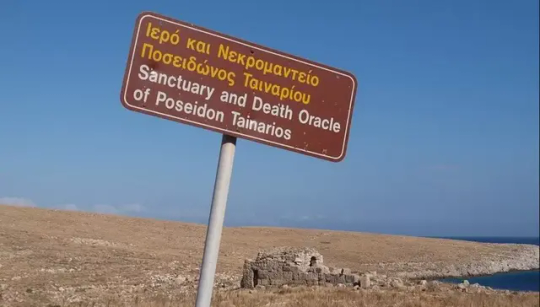
Greek sailors have been traditionally using the phrase "Stay forty miles away [meaning as far as possible] from Cape Matapan" ("Από τον Κάβο Ματαπά σαράντα μίλια μακρυά"), likely due to it once being a pirate hideout, as it's associated with bad luck.
#not to be confused with the gate to hades and death oracle in westernmost of continental greece by the acheron river#also while poseidon was the god of the sea he was very much associated with the underworld too especially in pre homeric times#dracula daily#historical context#dracula#the demeter#greece#peloponnese#the captain of the demeter#re: dracula
482 notes
·
View notes
Note
I read your post on the canonical likelihood that the Wizarding World follows Christianity rather than paganism commonly seen in 'pureblood culture' or political fics, so I kind of had a question?
There's the whole mess of God and the church against witchcraft (such as the banning of Harry Potter books), so how would that affect Christianity in the WW? Additionally (considering how many fics use it as rationale for pureblood bigotry), how do you think a pureblood culture fic would pan out around Christianity?
Hello 👋
I think I talked about this in the past here, but what we see with the anti-witchcraft sentiment in churches is relatively modern. Like, until the 1600s, incidentally, when the Statute of Secrecy became a thing, witch hunts and witch burnings weren't common. Until the latter half of the 1200s the Catholic church considered believing in witchcraft heresy and even after they started viewing witchcraft as devil work, they used witchcraft allegations to prosecute the Knight Templars in the 1300s and protestants in the 1400s, not actual witches. It was politics back then more than actual fear of witchcraft which we only start seeing late in the 1500s. But let's, take a look at witch hunts in history and see why the WW, who broke off from the muggle one in the late 1600s probably didn't really have a problem with Christianity (at least in the UK, the US, and other parts of the Europe are very different. The UK was actually not that big on the witch hunts compared to the rest of Europe).
Past entries in my 'wizards aren't pagan essays': part 1, part 2, part 3, part 4 (has the most quote evidence)
Witch Hunts Timeline:
(Many items on the list are taken from here)
~910 - The canon "Episcopi," a text of medieval canon law, was recorded. It condemned maleficium (bad-doing) and sorilegium (fortune-telling), but it argued that most stories of these acts were fantasy. It also argued that those who believed they could somehow magically fly were suffering from delusions. This text influenced later catholic church canon.
1154 - John of Salisbury wrote of his skepticism about the reality of witches riding in the night.
1230s - An Inquisition against heresy was established by the Roman Catholic Church. (Not against witches, against people who speak heresy)
1258 - The pope accepted sorcery and communication with demons as a kind of heresy, and therefore prosecutable by the church.
1306-1315 - The Church moved to eliminate the Knights Templar. Among the charges were heresy, witchcraft, and devil-worship.
1316-1334 - The pope issued several bills identifying sorcery with heresy and pacts with the devil.
1317 - In France, a bishop was executed for using witchcraft in an attempt to kill Pope John XXII. This was one of several assassination plots around that time against the pope or a king. (AKA accusations of witchcraft being about politics and not about magic).
1340s - The Black Death.
1401 - Parliament passed the Suppression of Heresy Act, the first English law authorizing the burning of unrepentant or reoffending heretics. With the intention to burn protestants translating the bible to English, not witches.
1484 - Pope Innocent VIII authorized two German monks to investigate accusations of witchcraft as heresy, threatening those who interfered with their work. (AKA accusations of witchcraft being about politics and not about magic. Again).
1486 - The "Malleus Maleficarum" (basically the witch hunters' bible, written by a dude who had nothing to do with the church) was published.
1492 - Nearly Headless Nick was beheaded, supposedly for witchcraft. I will note it's odd since witches/wizards were commonly hanged in Britain. Additionally, a priest actually came to comfort him in his cell prior to his execution on the block and he didn't even have a trial at all. So, his death wasn't really a proper witch trial as the first Witch Act in England was only passed in 1542, so he was executed before Witchcraft could have been legally tried in England and something more complicated happened there. My bet — politics that he doesn't like talking about.
1500-1560 - A period as one in which witchcraft trials, and Protestantism, were rising in Europe (These things were connected since the catholic church saw protestants as basically witches and burned/hanged them as well).
1542 - English law made witchcraft a secular crime with the Witchcraft Act.
1552 - Ivan IV of Russia issued the Decree of 1552, declaring witch trials were to be civil matters rather than church matters.
1560s-1570s - A wave of witch hunts was launched in southern Germany. The witch hunts really started in Europe as civil law trials, not church prosecution.
1563 - The second English Witchcraft Act was passed in England. Again, treating it as a civil offense, not a religious one.
1580-1650 - Considered the period with the largest number of witchcraft cases in Europe. Most cases of witch hunts in the UK though, happened in the 1640s, and the worst of it lasted only 14 months.
1682 - Mary Trembles and Susannah Edward were hanged, the last documented witch hangings in England itself.
1689 - The Statute of Secrecy was signed.
1692 - Salem witch trials took place in the British colony of Massachusetts.
1692 - The Statute of Secrecy went into effect.
1717 - The last English trial for witchcraft was held; the defendant was acquitted.
1736 - The English Witchcraft Act was repealed, formally ending witch hunts and trials. (Most of Europe only officially ended witch hunts later).
So we can see that the actual witch hunts (trials and burnings) were a secular civil matter and that church law wasn't really a part of it. For most of the medieval period, believing in witchcraft would have been seen as heresy, and even into the 1400s the church was more concerned with prosecuting protestants and political opponents than witches (which many clergymen still doubted the existence of) — because they saw them as the real danger. Basically, the witch hunts weren't a religious medieval thing as they are often portrayed, but a Renaissance civil movement for the most part. (In Europe, at least, the witch hunts in the American colonies are a whole other beast that operated diffrently).
In England, the laws regarding witchcraft were civil laws made by parliament, not by the church. And the witch hunts in England were shorter (in time period they took place over) than most other Western countries (France, Germany, and the US, for example, had longer witch hunt periods, more anti-witch laws, and a higher death toll to these hunts). So it makes sense the wizards in the UK wouldn't really see anything contradictory between being Christian and being witches/wizards since the prosecution didn't come from the church. It came from their muggle neighbors:
The persecution of witches and wizards was gathering pace all over Europe in the early fifteenth century. Many in the magical community felt, and with good reason, that offering to cast a spell on the Muggle-next-door’s sickly pig was tantamount to volunteering to fetch the firewood for one’s own funeral pyre. “Let the Muggles manage without us!” was the cry, as the wizards drew further and further apart from their non-magical brethren.
(Albus Dumbledore on “The Wizard and the Hopping Pot”, Tales of Beedle the Bard)
The wizards' disdain wasn't for the church or Christianity but for the muggles in the homes next to them. That's who betrayed them and hunted them down, not the church. This is why we see the kind of anti-muggle sentiment we see. Becouse wizards' neighbors, muggles whom they helped and lived beside for generations turned on them. For the WW, the hunter wasn't the church, it was the muggle next door.
And if we look at the numbers of accused witches killed, the UK and Ireland were on the lower estimates in Europe:
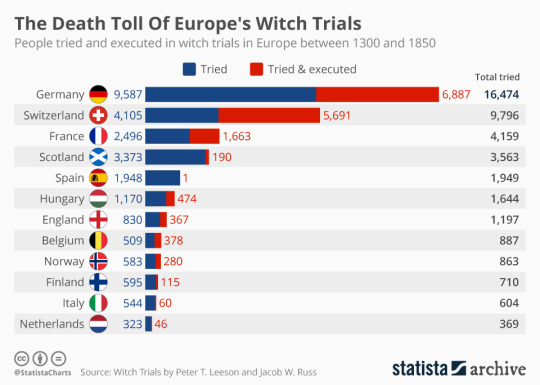
Scotland acquitted almost all tired witches and while England killed more, the number of trials and executions was much lower than in Germany, Switzerland, and France. Even though Belgium and Norway had fewer trials, they killed more of the witches tried than England by percentage. Ireland isn't even on this list but their numbers are even lower. (Spain is low on the witch executions since the Inquisition was more concerned with religious opponents and heretics than witches):

(Source - a book about the economic and religious background to the witch hunts, for anyone curious. I will note I've seen higher estimates of the death toll of the witch hunts, but these higher estimates are often not based on existing historical records so it's hard to know the real number of deaths)
This context about how the witch hunts were worse in central Europe explains why Durmstrang and Beauxbatons are so secretive about their location compared to Hogwarts. It also gives context to why Grindlewald had more supporters from these areas and why even Voldemort had supporters from Durmstrang (Karkaroff and Dolohove maybe) even if they have nothing to do with Britain — the anti-muggle sentiment is just more widespread there because the witch hunts were worse there ("There" being the Holy Roman Empire). I think this gives interesting context to the world-building.
As for the second part of your ask:
Religion in pureblood society
This part has more of my headcanons sprinkled in and isn't strictly canon, but here's how I see it.
We don't really see them going to church on Sundays or even on holidays. In general, church-going isn't one of the traditions they adhere to. If it was, we would've likely seen a small chapel at Hogwarts, but there isn't one.
That makes a lot of sense. The reformation of the church happened in the early 1530s (it's a little more complex because Mary tried to return catholicism but I'm not going into that), hence before wizards broke away from muggle culture, so most wizards we see (Ones from the UK at least, as I assume the Irish ones (not north Ireland) are still mostly catholic) are what I call Magical Anglican. They are Anglican but with a magical flare and some unique wizard saints.
As Anglicans are protestants, their doctrine is more focused on the Bible than the church. So the average Magical Anglican wizard in the UK probably steps foot in a church only on rare occasions and mostly practices the traditions and holidays without a church involved. We see a wizard priest conduct weddings and funerals outside, wherever the wizards are, so clearly it's not about the church for them. It's about the community.
That being said, I think certain communities, such as Godric's Hallow, do go to church on holidays. In DH, when Harry and Hermione notice a sermon for Christmas at the church in Godric's Hallow, I headcanon many of the wizards living there were in the church that night.
In general, they seem to celebrate all the Christian holidays and have their own traditions for them. Like, the Christmas hats on the house elves' heads at Grimmauld Place. Like, I headcanon that's something Sirius' family did when he was a kid and even before that. I mean, why else would they have little house elf Christmas hats for all the mounted heads just sitting there ready?
Their decorations have a magical flare, and so do their holiday traditions, but they're mostly the same. Yes, their Christmas crackers are magical, but Christmas crackers are a thing in Britain. Yes, they place gnomes or fairies atop the Christmas tree, but it still is a tree topper that serves the same purpose. Yes, their carols are a little different, but they are still Christmas carols that mention god.
I like to headcanon godparents are pretty common in the WW, and that Magical Anglicans baptize infants pretty regularly. I mean, everyone in universe treats being a godparent like a big deal, and something important they respect. So, culturally, I believe purebloods christian their kids and that most wizards have godparents. I headcanon said godparents are usually relatives.
Like, I headcanon Alphard (Sirius' uncle who left him money) was Sirius' godfather. I like to headcanon Cygnus and Druella were Regulus' godparents. I also like to headcanon Uncle Billius, from whom Ron got his middle name from Ron's godfather. Sirius was Harry's godfather as a the brother-from-another-mother he was for James.
Purebloods might hold Yule Balls like we see in GOF, but, like in the book, it has nothing to do with the pagan holiday and more to do with just a cool wintery theme for the ball.
I can totally see some purebloods (I think not all purebloods are actually upper class) having fancy dinner parties for holidays too. Like, that seems to me like something they'd do besides balls. Like, I want to be a fly on the wall in my headcanoned Black family Christmas dinner with all the cousins and aunts and uncles when Sirius was 11. Just, imagine it.
So, while they aren't regular church-goers, I think you can see the footprint of Christianity all over their culture.
I mean, Hogwarts doesn't have a church, but they serve pork in meals on the regular in the Great Hall, something Jewish or Muslim wizards would not eat if they followed their religions' rules. The calendar Hogwarts operates by is one that follows Christian holidays like Christmas and Easter. They don't work/study on Sunday, which is a Christian thing. In Muslim countries, Friday is the holiday day, while in Israel, it's Saturday. Even these little things that seem obvious are based in Christianity. Yes, it's the case in Britain, but if wizarding culture was separate enough to have a different religion, I doubt they would've kept all these little footprints of Christianity in their society.
The way I see it, they're Christian in faith and ideals, but have some of their own magical spins on the traditions and holidays. They are more focused on their community than going to Church (which might be a result of the muggle communities they lived in turning on them). So, that's kinda how I see religion in the WW.
(Obviously, this is different in different areas even in the UK, and could vary from family to family. This is more the general vibes I got and some headcanons).
#harry potter#hp#hp meta#asks#anonymous#hollowedtheory#harry potter meta#wizarding world#wizarding society#wizarding religion#hp headcanon#hollowedheadcanon#historical context#witch hunts#wizarding history
40 notes
·
View notes